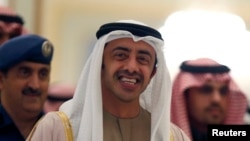The United Arab Emirates says it will have “positive news” within the next few days concerning its participation in the U.S.-led airstrikes against the Islamic State militant group.
A senior State Department official said the UAE made the announcement Friday during a meeting between U.S. Secretary of State John Kerry and Gulf Cooperation Council ministers.
Kerry and the GCC ministers from Bahrain, Oman, Qatar, Saudi Arabia, Kuwait and the UAE met in Germany on the sidelines of the Munich Security Conference.
The State Department official said UAE Foreign Minister Abdullah bin Zayed gave the impression that the flights would be resuming within the next few days.
The UAE suspended its participation in coalition airstrikes after Islamic State captured a Jordanian fighter pilot in December, when his plane went down in Syria.
As it announced its suspension, the UAE urged the U.S. to be better prepared to rescue any downed coalition pilots.
The official said Kerry and the GCC ministers agreed that Islamic State’s brutal killing of the pilot had a “unifying” effect on the U.S.-led coalition, causing it to double its resolve to fight the militant group.
Progress in Iraq
Looking at the overall effort to degrade and defeat Islamic State forces, the senior State Department official said there was a “broad consensus” that the mission was going “pretty well” in Iraq.
The official said there also was broad agreement that the political situation in Iraq was improving, although some GCC members expressed concern that Shiite Prime Minister Haider al-Abadi was not reaching out sufficiently to the country’s Sunni population.
The official said that regarding Syria, some GCC ministers expressed concern about President Bashar al-Assad’s “longevity” in power. The official said Kerry reaffirmed the U.S. position that Assad needed to step down.
Yemen's crisis
Kerry and the GCC also discussed Yemen, where Houthi rebels moved Friday to strengthen their takeover.
The rebels formally dissolved parliament and announced plans to form a new assembly and a presidential council to replace President Abd Rabbuh Mansour Hadi, a strong U.S. ally. Hadi announced his resignation last month after the rebels surrounded his residence.
GCC ministers “were articulate about the threats that an unsettled Yemen” posed to the region, the State Department official said.
The official said the group discussed possible steps to address Yemen’s unrest through diplomatic and security approaches. Some ministers suggested the international community needed to take a stronger position through the United Nations or another multinational organization.
Concern about nuclear talks
During the talks, some GCC ministers also expressed concern about “Iranian influence in the region,” according to the senior State Department official.
The official said Kerry assured the ministers the U.S. would not conclude talks with Iran on its nuclear program with a “bad nuclear deal.”
Iran and the five permanent members of the U.N. Security Council and Germany are negotiating an agreement on the scope of Iran’s uranium enrichment that addresses concerns Iran is trying to make nuclear weapons and gives Iran relief from crippling sanctions. Negotiators hope to have an agreement by a July 1 deadline.
Earlier Friday, Kerry, Iranian Foreign Minister Javad Zarif, and EU deputy foreign policy chief Helga Schmid held talks in Germany on the nuclear issue.
The senior State Department official said GCC ministers were “anxious” to have more meetings with Kerry because of the regional challenges they face.
The official said most ministers planned to attend President Barack Obama’s February 18 global security summit in Washington. The official said the group might meet again on the sidelines of the summit.




